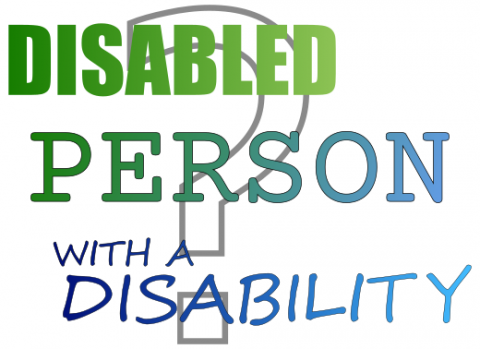But Words Affect Attitudes
There’s a big difference in disability discourse between the US and the UK. This is largely summed up in how the disability movement in each country prefers to refer to the people it is talking about: here in the UK, we say “disabled people”. In the US, they say “people with disabilities”. At the UN, they say “persons with disabilities”, but that’s for a whole other set of reasons.
It doesn’t sound like a big difference, but campaigners and theoreticians in both countries will vociferously defend their preferred language. To the Americans, it’s important that the language be “person first”, to make it harder to elide the personhood of such individuals. To the Brits, it’s reflective of the “social model of disability”, a theoretical construction by campaigners and academics that originates at least as far back as the 70s, when the Union of the Physically Impaired Against Segregation said “it is society which disables physically impaired people. Disability is something imposed on top of our impairments”. The social model thus differentiates between impairment and disability, where impairment is the difference in function, be it physical, emotional, sensory, cognitive… you get the idea; disability is the social disadvantage faced as a result of impairment.
Thus the Americans feel that British language is impersonal and makes it too easy to forget the “person” part, while Brits feel that American language is perpetuating attitudes to disability that ignore the responsibility of a just society to all its members. I dramatically oversimplify, of course – there’s more to the difference of language than that, and there are of course people on each side of the Atlantic who prefer the choices of those across the pond.
It seems to me self-evident that what matters most, in the approach to disability in society, is that we be just, not merely compassionate. That we recognise that the arrangement of society by largely unimpaired people fails to include impaired people, and thus discriminates against us. That is the essence of the social model, and the issue of language would seem to be secondary. It is also reflected in the UN Convention on the Rights of Persons with Disabilities (UNCRPD), and in the approach of most western disability campaigning, especially that led by disabled people. What matter, then, what language we use? Isn’t the social model language only truly meaningful when the audience understands the definition of “disability” in use, and the distinction lost on those who don’t already understand it?
I’m not sure. It should be no surprise at this point that I’m a proponent of the social model, though expressions of it have been known to have problems – tending to focus on gross physical disability in ways that are hard to apply to a lot of cases of chronic ill health. That can all be worked out with a bit of time and discussion. Yet I also know that most people that we, as disabled people, speak to about disability won’t know about it, and trying to educate them all probably isn’t the most efficient way to go about it. Yet still I struggle with “people with disabilities”. I can sympathise with the aim of “person first” language – I’ve seen enough people elide “disabled people” to “disableds”, sometimes innocently, and others as a reflection of the person’s attitude to us. I don’t know how much mileage there is in making people say the word “people” in order to make them think of us as people, but maybe there’s something there. Ultimately, I won’t argue with anyone about their choice of language in this area unless they want to have that conversation – and we’ll talk about it on an intellectual level, rather than berating.
No, my problem is with “with disabilities”. It’s not just that the language doesn’t fit the social model – I’m not just railing against it out of some sense of intellectual purism (though I’ll admit there’s a bit of that). There’s actually a deeper meaning to the “with disability” that I can’t shake, and that I’m not comfortable with. The idea that disability is attached to us, even part of us – that it is intrinsic (barring some sort of cure). To me, that seems to feed a complacency – that the blind will always be blind, and we do what we can but, at the end of the day, they’re blind. Yes, they are. Yes, barring cures, they will be – and most causes of blindness apart from cataracts seem to be progressive; treatment will maybe slow it, but not reverse it. Until we have bionic eyes, most people who are blind are stuck being blind.
The thing is, they aren’t stuck being excluded from society. What excludes them from society is the fact that our society is arranged, largely, on the assumption that people can see – much as it is on the assumption that people can walk, that they can work predictable hours, that they can get up in the morning and get to sleep at night, that they aren’t in constant pain. That can all be changed, and must be changed, before we can claim to live in a just society.
The separation of impairment and disability in social model discourse is not an intellectual game. It is what allows us to argue that disability is an axis of oppression, like race, gender, and sexuality. It is what allows us to argue not for special treatment so that we can join in, but for fair treatment so we aren’t excluded; even if the practical result of the two ways of expressing that goal would be the same, the sense of injustice to be corrected is very different.
